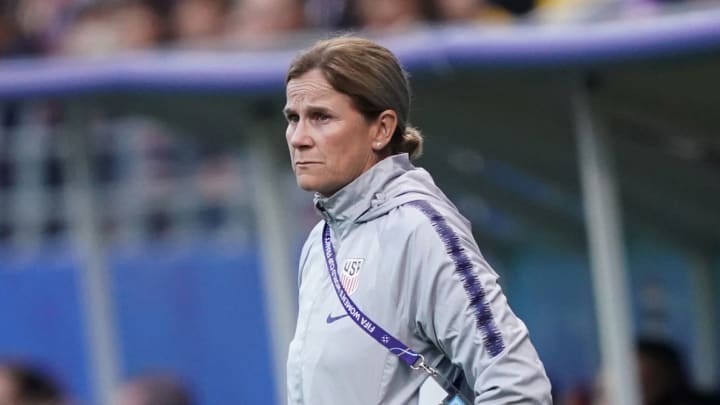As USWNT Prepares for Chile, Ellis Addresses Potential Collision Course With France

PARIS — The U.S. meets Chile in the Americans’ second game of Women's World Cup 2019 on Sunday (noon ET, FOX, Telemundo), and while the Chileans are ranked by FIFA below Thailand, don’t expect another 13-0 thrashing in this one. Chile played Sweden tough in a 2-0 loss on Tuesday, and La Roja’s Christiane Endler, who plays for PSG, is one of the better goalkeepers in the tournament.
That said, few are expecting the U.S. to have much trouble against Chile, which the Yanks beat 4-0 and 3-0 in two friendlies last fall.
In fact, with the U.S. drawing low-ranked opponents in its first two games, it’s hard not to look at the collision course between the U.S. and France, the two best Women's World Cup teams so far and gamblers’ two favorites to win the tournament. If the U.S. and France continue winning their games, they’ll meet in the quarterfinals here at the Parc des Princes on June 28. France’s victory over Norway on Friday means the French have done nearly everything on their part—they need at least a point against Nigeria on Monday—to win their group.
And so I asked U.S. coach Jill Ellis on Saturday: I think I know your answer on this, but would you consider ever telling your team not to go at 100 percent to avoid a situation like meeting France in the quarters?
Let me be clear here. There’s no way that anyone would expect Ellis to say, “Yeah, I’ll ask my players to try to lose against Sweden so we can avoid France. We’re scared of the French.” But you ask the question to get a response on the record, and then you have something that you can try to interpret. Plenty of Internet yuksters will say: “Newsflash: Ellis, after 13-0 win, says her team will go 100 percent.” But: whatever. You still at least have her answer.
And this is what Ellis said: “I struggle to tell my team not to tackle each other in training the day before. So yeah, I think at this point it’s making sure your focus is on yourself and your performance is about yourself and you put yourself in the best position to advance in this tournament. For us, it’s making sure that we play as well as we possibly can in every game.”
After 13-0, what can we expect from the #USA vs. #CHI in tomorrow's match at the #FIFAWWC? @GrantWahl breaks it down on this week's Planet Fútbol TV.
— SI Soccer (@si_soccer) June 15, 2019
For more Women's World Cup analysis and #CopaAmerica, watch with a FREE SI TV trial https://t.co/XusHz3R5FO pic.twitter.com/AfTpuaHQDB
There’s actually a fair amount to try and interpret here in Ellis’s response. For one thing, she never just says: “No, I wouldn’t consider that.” Then there’s the statement: “You put yourself in the best possible position to advance in the tournament.” You could argue that the U.S. would be in a better position to advance in the tournament if it avoided France in the quarters. (Though it should be noted that a Spain-France scenario in the U.S.’s first two knockout games wouldn’t be that much harder than, say, a Canada-Germany scenario on the other side of the bracket.)
But then you look at Ellis’s last statement: “For us, it’s making sure that we play as well as we possibly can in every game.” And, you know, that’s fairly definitive. Though she still didn’t say no to the original question, which is interesting. That’s why you ask the question in the first place.
Otherwise, heading into the USA-Chile game, the biggest question is whether Ellis will make significant changes to the lineup she used in the Thailand game. If you look at what Ellis did for Game 2 in the 2015 World Cup and 2016 Olympics, she didn’t make many changes. But this U.S. roster has even more quality depth than her previous ones, and if there’s one game that you could think we might see several changes, it would be this one.
“Well, you’ll know when the lineup comes out,” Ellis said when asked on Saturday. “I think when we started the World Cup in 2015, Alex [Morgan] was on a plan not to be playing until the round of 16 or the quarters because of her injury. We certainly were limited in terms of availability because of some injuries. But we have a pretty exciting core group.”
She continued: “I think as I look back, someone on my staff keeps track of all the minutes all the players have played, and you just kind of look at that. In my mind, I think there was a number in terms of, I hope no one has less than this, but I thought to myself, if I bring a new player to this World Cup, I think a minimum of 30 caps is I feel experienced and ready.”
And finally: “And in terms of playing time, I think most of our players that are on the roster, maybe bar a couple, have had a lot of significant minutes. So having that trust and having that faith in those players, for a coach it certainly strengthens you. But I also see it for the players themselves. It strengthens them in terms of knowing that we have the depth. We want to make this a long tournament, and to do that we certainly know it’s going to take a lot of physical effort and output and every single one of those players.”
My sense: We’re going to see a lot of changes against Chile—but not in the outcome of the game.

A leading soccer journalist and best-selling author, Grant Wahl has been with SI since 1996 and has penned more than three dozen cover stories.